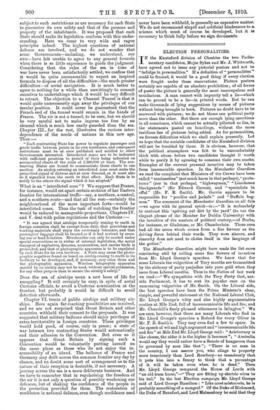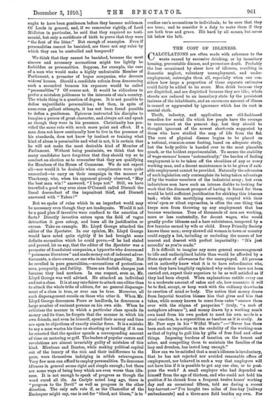ELECTION PERSONALIT11N.
TN the Knutsford division of Cheshire the two Parlia- mentary candidates, Major Sykes and Mr. J. Whitworth, have agreed not to issue any pictorial posters and not to "indulge in personalities." If a definition of " personalities " could be framed, it would be a good thing if every election were fought under these reservations. Picture posters certainly are capable of an absolute prohibition ; of all forms of poster the picture is generally the most unscrupulous and mendacious. A man cannot with impunity tell a lie—which can be proved to be a lie—in printed words. But be can make thousands of lying suggestions by means of pictures without being brought to book. Pictures no doubt have to be answered with pictures ; we do not blame one political party more than the other. But there are enough lying assertions in all conscience, which cannot be actually pilloried as lies, in the statements pasted on hoardings, without the more insidious lies of pictures being added. As for personalities, we foresee difficulties which we shall explain presently. Let us hope that the amiable candidates of the linutsford division will not be troubled by them. It is obvious, however, that the political atmosphere was felt to be uncomfortably thick with abuse before two candidates thought it worth while to purify it by agreeing to consume their awn smoke. Examples of the current personal invective may be taken from innumerable speeches. In the Manchester Guardian we read the complaint that Ministers of the Crown have been called "marionettes" (not mach harm in that perhaps)," panta- loons " (nor in that perhaps), "highwaymen," " Limehouse blackguards" (Sir Edward Carson), and "specialists in offal" (Mr. F. E. Smith). Mr. Garvin appears to be responsible for "poodles and jackals" and "Buffalo bag- men." The comment of the Manchester Guardian on all this —we agree with its general spirit—is :—" It is melancholy to contrast this spitting out dirt by the yard' (to use the elegant phrase of the Member for Dublin University) with the invective of the masters of political oratory,—of Burke, for instance, or Gladstone, or Mr. Chamberlain. These men had all the scorn which comes from a fine fervour as the driving force behind their words. They went sincere, and sincerity does not need to clothe itself in the language of the gutter."
The Manchester Guardian might have made the list more convincing still by culling some fine flowers of invective from Mr. Lloyd George's speeches. We know that for some Liberals the vulgarities of Tory mouths are transmitted by the alchemy of party prejudice into pure gold when they issue from Liberal months. Thus in the Nation of last week we read:—" We sympathise with the Tory Party that, out- side Parliament, it has to rest its popular case on the unmeaning vulgarities of Mr. Smith. On the Liberal side, the best speeches have been the Prime Minister's clear, simple, and powerful statement at the National Liberal Club, Mr. Lloyd George's -witty and also highly argumentative oration at Mile End, full of incommunicable life and fire, and Mr. Churchill's finely phrased utterances in Islington." We are sure, however, that there are many Liberals who find in Mr. Lloyd George's speeches a Roland for every Oliver in Mr. F. E. Smith's. They may even find a few to spare. In the speech of wit and high argument and" incommunicable life and fire" at Mile End Mr. Lloyd George said : Aristocracy is like cheese, the older it is the higher it becomes "; "Australia would say they would rather have a Senate of kangaroos than be governed by men like that "; "There is no man in the country, I can assure you, who clings to property more tenaciously than Lord R,osebery—so tenaciously that it pats him into a frenzy to think that a percentage of it will be taken even when he is dead." Then Mr. Lloyd George compared the House of Lords with "an old tram horse,"—" They are fitting up electric wires to his tail." In the last Election campaign Mr. Lloyd George said of Lord George Hamilton : "Like most aristocrats, he is probably something of a mongrel." Of the Duke of Richmond, the Duke of Beaufort, and Lord Malmesbury he said that they
ought to have been gentlemen before they became noblemen Of Lords in general, and, if we remember rightly, of Lord Midleton in particular, he said that they required no testi- monial, but only a certificate of birth to prove that they were "the first of the litter." But enough of examples. Even if personalities cannot be banished, are there not any rules by which they can be controlled and tempered?
We think that they cannot be banished, because the most sincere and necessary accusations might too lightly be forbidden as personalities. Suppose, for example, the ease of a man who would make a highly undesirable Member of Parliament, a promoter of bogus companies, who devours widows' houses. Should a candidate refrain from denouncing such a scoundrel because his exposure would be called " personalities" ? Of course not. It would be ridiculous to prefer a mistaken politeness to the interests of one's country. The whole thing is a question of degree. It is not possible to define unjustifiable personalities ; but then, in spite of numerous gallant attempts, it has not been found possible to define a gentleman. Epicurus instructed his disciples to imagine a person of great character, and always act and speak as though they were in his presence. Christianity has pro- vided the same rule with much more point and effect. If a man does not know continually bow to live in the presence of his standards, does not know by instinct or training what kind of abuse is permissible and what is not, it is certain that he will not make the most desirable kind of Member of Parliament. Without being pessimists, we think that too many candidates have forgotten that they should try so to conduct an election as to remember that they are qualifying for Members of the House of Commons. We do not expect all—nor would it be desirable when compliments were quite unmerited—to carry on their campaign in the manner of Thackeray, who, when his opponent piously observed, "May the best man win ! " answered, "I hope not." Still, we have travelled a good way even since O'Connell called Disraeli the lineal descendant of the impenitent thief, and Disraeli answered with " Yahoo !"
But we spoke of rules which in an imperfect world may be necessary even though they are inadequate. Would it not be a good plan if invective were confined to the assertion of facts ? Directly invective enters upon the field of vague detraction it goes astray, and loses all its justification or excuse. Take an example. Mr. Lloyd George attacked the editor of the Spectator. In our opinion, Mr. Lloyd George would have acted quite rightly if he had brought some definite accusation which he could prove,—if he had stated and proved, let us say, that the editor of the Spectator was a promoter of fraudulent companies, a hypocrite who denounced " poisonous literature" and made money out of indecent adver- tisements, a slave-owner, or one who incited to gambling. But he revelled in pure generalities,—accusations of pretentious- ness, pomposity, and futility. These are foolish charges just because they lead. nowhere. In one respect, even so, Mr. Lloyd George was well advised. He attacked an individual and not a class. It is at any rate fairer to attack one editor than to attack the whole tribe of editors, for no general disparage- ment of a class is true, or ever can be true. Moreover, all such disparagement recoils on those who utter it. When Mr. Lloyd George denounces Peers or landlords, he denounces a large number of eminent persons on his own Bide. When he criticises the manner in. which a particular class spends its money and its time, he forgets that the manner in which his own friends, and even he himself, spend their money and time are open to objections of exactly similar force. It is a mistake to say a man wastes his time on shooting or hunting if it can be retorted that the speaker spends a corresponding amount of time on motoring or golf. The leaders of popular causes and revolutions are almost invariably guilty of mistakes of this kind. Mirabeau and Denton, while making political capital out of the luxury of the rich and their indifference to the poor, were themselves indulging in selfish extravagance. Very few men can afford to employ personalities. To denounce idleness in general seems right and simple enough ; but there are some ways of being busy which are even worse than idle- ness. It is not enough to speak of progress as though the word cured all ills. As Carlyle noted long ago, there is 'progress to the Devil" as well as progress in the other direction. The only safe rule if, as the Chancellor of the Exchequer might say, one is out for "blood, not bloom," is to
confine one's accusations to individuals; to be sure that they are true; and to consider it a duty to make them if they are both true and grave. Hit hard by all means, but never hit below the belt.











































































 Previous page
Previous page